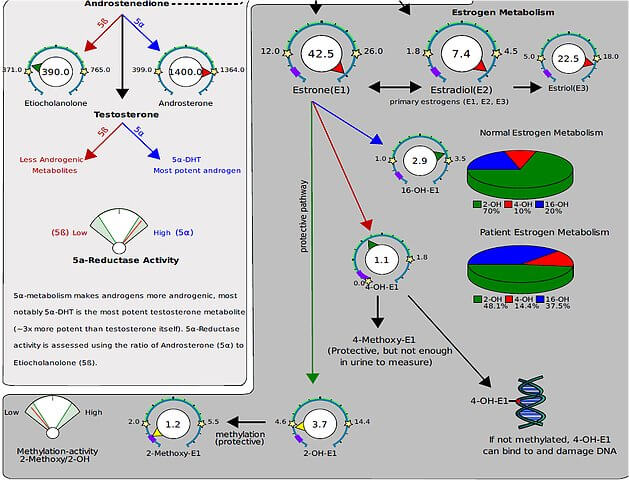For many women, menstrual periods are a recurring event marked by pain, agony, and uncontrollable mood swings. While their partners should be careful not to attribute this to their personality, dysfunctional periods (aka dysmenorrhea) and PMS are real medical issues with foundations in biochemistry.
From a conventional medicine point of view, there are a few disease entities that may cause dysmenorrhea, including uterine fibroids and endometriosis, among others. Depending on the cause, treatment options usually range from anti-inflammatory pain relievers (i.e. Ibuprofen) to oral contraceptive pills to other hormonal treatments to surgery.
Functional medicine physicians, while also concerned with the pathology, additionally take the approach of rebalancing what is fundamentally imbalanced. In this approach, it is more about investigating “why” the symptoms are happening than “what” is the pathology. In a patient whose primary symptoms are dysmenorrhea and PMS, the most likely primary imbalance is a sex hormone imbalance.
Let’s take an example…
Case study: 38 year old female who is otherwise healthy with painful periods and PMS. Patient also mildly obese, average American diet with low vegetable intake and high carbohdyrates. The patient had seen multiple other doctors and was thought to have endometriosis. She had been treated with Ibuprofen with minimal success.
A full functional medicine analysis was done, and among other tests, the following is her sex hormone panel:

The results show a high level of estrogen.
Her estrogen metabolism panel showed the following:

The results show a very low 2:16 hydroxyestrone ratio as well as a low methylation activity.
Based on her overall functional medicine analysis, the reason why her hormones were imbalanced was a problem with detoxification of her hormones. In other words, her liver was not clearing estrogen from her body properly. As part of her functional medicine therapy, she was advised to consume more cruciferous vegetables, take an indole-3-carbinol (I-3-C)/diindolymethane (DIM) supplement, take a fiber supplement, and increase her exercise. She was also given supplements to help support her methylation. Over the next several months, she was able to successfully rebalance her hormones and her symptoms of painful periods and PMS went away.
The Major Causes of Hormone Imbalance
Every person is unique in their underlying biochemistry; however, some of the major causes of hormonal imbalance are listed below:
1. Endocrine disrupting chemicals: There are many chemicals in the environment that we are exposed to that disrupt the normal hormonal system. For example, you may have heard of something called Bisphenol-A (BPA), which is found in plastics. Others include industrial solvents (such as polychlorinated biphenyls [PCBs]), plasticizers (such as phthalates), preservatives (such as parabens), and pesticides. These are found in many of the foods, cosmetics, personal care products, and medications that we use regularly.
2. Poor diet: A suboptimal diet will affect the hormones in multiple ways. Firstly, if the diet is too high in carbohydrates, excess insulin will be produced, which can alter the production of testosterone. Excess fat in general will stimulate more production of estrogen. Additionally, a diet low in healthy fats will predispose towards not being able to properly synthesize hormones in the correct ratios. A diet high in non-organic meat will likely result in a high amount of exogenous hormone intake. Conventional farms routinely inject hormones into their grain-fed cows to bulk them up and the excess hormones get transmitted to us. Various nutrients and vitamins are also needed to process the hormones biochemically, and various deficiencies will also predispose toward hormonal imbalance.
3. Stress: Sex hormones are not the only hormones we have. Additionally we have stress hormones (such as adrenaline), which help us respond to problems we need to deal with. However, if we are under chronic stress, we can develop what is called “Adrenal Fatigue” which is a burnout of the stress hormone system. Adrenal fatigue is a common contributor to sex hormone imbalance.
4. Lack of exercise: Physical exercise has been proven to help balance sex hormones.
5. Inefficient detoxification: As demonstrated with our case above, hormones need to be detoxified and cleared from the body in order to maintain balance.
Re-balancing the hormones
The first steps to general hormonal balance include:
1. Consume a high-fiber, low-carbohydrate diet.
2. De-stress your life.
3. Exercise.
The hormonal system is intricate and complex. Everyone has a unique biochemistry and the type of hormonal imbalance as well as the underlying causes should be individualized. Consult with your Functional Medicine physician to figure out what your fundamental imbalances are and how best to treat them.

